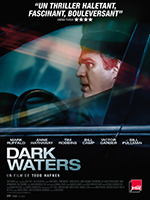The conference will be held in Lyon in relation to participatory and exploratory research on exposure to industrial pollution in the Lyon chemical valley. It will combine presentations by scholars from different disciplines and countries with panels or round-table discussions with actors from civil society.

The event will start with a projection and debate around the film Dark Waters by Todd Haynes, at the Cinema Comoedia in Lyon, on Sunday, June 11th at 8pm. We will enjoy the presence of Ms Louise Tschanz, lawyer for the firm Kaizen Avocat, specialist in environmental law.
The first day will focus on the per- and polyfluoroalkyls (PFAS), with presentations from North American and European scholars and journalists in the morning, and a discussion between researchers, exposed populations and stakeholders from all over Europe in the afternoon that will address experience of mobilization and the boundaries between environmental health and occupational health when it comes to industrial pollution.
The second day will focus more specifically on the issues related to interdisciplinarity in the field of environmental and occupational health, based on concrete experiences of interdisciplinary collaborations and pointing out the challenges or difficulties to be met to carry them out, particularly in relation to the question of the progression from data to evidence.
The objective is to find new forms of scientific research engagement with environmental health issues in an open science perspective and in collaboration with stakeholders.
Programme
Simultaneous translation on both directions french <-> english will be available on June 12th and 13th
Sunday, June 11th
20:00 : Projection and debate around the movie Dark Waters de Todd Haynes au cinéma Le Comoedia in Lyon with Me Louise Tschanz, lawyer of the firm Kaizen Avocat, specialist in environmental law.
Monday, June 12th
Amphitéâtre Lucie et Raymond Aubrac, see the map
8:45 - 9:15 : Welcome
9h-:15 - 9:30 : Opening remarks, Emmanuel Henry (Université Dauphine-PSL/Institut des sciences humaines et sociales, CNRS) & Gwenola Le Naour (Sciences Po Lyon)
9:30 - 10:30 : Keynote - "Landscapes of Ignorance and Knowledge Production in the Case of PFAS", Lauren Richter (University of Toronto)
10:30-11h:00 : Coffee break
11:00 - 12:00 : PFAS - Making the forever chemicals visible in Europe and the United-States
- "The PFAS Project Lab: Interdisciplinary Research on PFAS Problems", Alissa Cordner (Whitman College) (recorded message)
- "Forever Pollution Project: Creating Knowledge With a 'Peer-Reviewed Journalism' experiment", Stéphane Horel (Le Monde)
Moderator : Henri Boullier (Université Paris-Dauphine PSL*, CNRS)
12h-:30 - 14h:00 : Pause déjeuner
14:00-16:00 - Roundtable 1 - PFAS, How to create evidence for the exposed populations ?
- Claudia Marcolungo (Università di Padova e collaboratrice delle mamme no PFAS) & Michela Piccoli (Mamme No Pfas), Italie
- Hedwig Rooman (Collectif Grondrecht), Belgique
- Joop Keesmat (Collectif d’habitants de Sliedrecht), Pays-Bas
- Camille Panisset (Notre affaire à tous Lyon)
- Gretta Goldenman (Global PFAS Science Panel)
Moderator : Riccardo Emilio Chesta (Polytechnic University of Milan)
16h-16h30 : Coffee break
16h30-18h30 : Roundtable 2 - Fenceline communities and factory workers, same issues ?
- Philippe Chamaret (Institut Ecocitoyen pour la connaissance des pollutions)
- Jean-François Naton (CESE groupe cgt)
- Anne Marchand (Université Paris Nord & Co-directrice du Giscop93)
- Bernard Bouché (Solidaires)
- Henri Bastos (ANSES)
Moderator : Renaud Bécot (Sciences Po Grenoble)
19h : Cocktail diner
Tuesday, June 13th
Amphitéâtre Lucie et Raymond Aubrac, see the map
9h30-11h00 : Panel - Interdiciplinarity : tricks of the trade
- "An interdisciplinary and integrated approach to break the deadlock on the pesticide issue? The case of the scientific network HOLIMITOX", Laurence Huc (INRAE)
- "A socio-epidemiology of the links between work and health: small-scale multidisciplinary cooperation to shed light on health disparities between social groups", Émilie Counil (INED)
- "Manufactured materials, toxicity, ecotoxicity and risks: lessons from 15 years of interdisciplinarity experience", Corinne Chanéac (Sorbonne Université, CNRS), Catherine Santaella (Institut de Biosciences et Biotechnologie d'Aix-Marseille, CNRS)
- "Environmental epigenetics: recent advances, new avenues, and collaborative opportunities", Patrick Allard (UCLA)
- "From the identification of the health impacts of air pollution to concrete solutions to limit them at the urban level: QAMECS-Mobil'Air project", Rémy Slama (INSERM)
Moderator : Stéphanie Vermeersch (Institut des sciences humaines et sociales, CNRS)
11h-11h30 : Coffee break
11h30-12h30 : Discussion with the participants to the previous panel, joinded by Paul Schmitsdorf (Université Toulouse II Jean Jaurès)
Moderator : Stéphanie Vermeersch (Institut des sciences humaines et sociales, CNRS)
12h30-14h : Lunch break
14h-16h : Roundtable 3 - How to produce, organize and process interdiciplinary data ?
- Léa Prost (Université Paris-Est Créteil)
- Gwenola Le Naour (Sciences Po Lyon), Emmanuel Martinais (ENTPE), Valentin Thomas (Sciences Po Lyon et European University Institute), Abdelkader Souifi (INSA Lyon, CNRS)
- Marie-Christine Rousset (Université Grenoble Alpes)
- Sarah Cohen-Boulakia (Université Paris-Saclay)
Moderator : Pascal Taranto (Université Aix-Marseille)
16h-16h30 : Conclusions et perspectives
"Chemical Information: Protecting Proprietary Knowledge or Protecting People" - Angela N.H. Creager (Princeton University)



